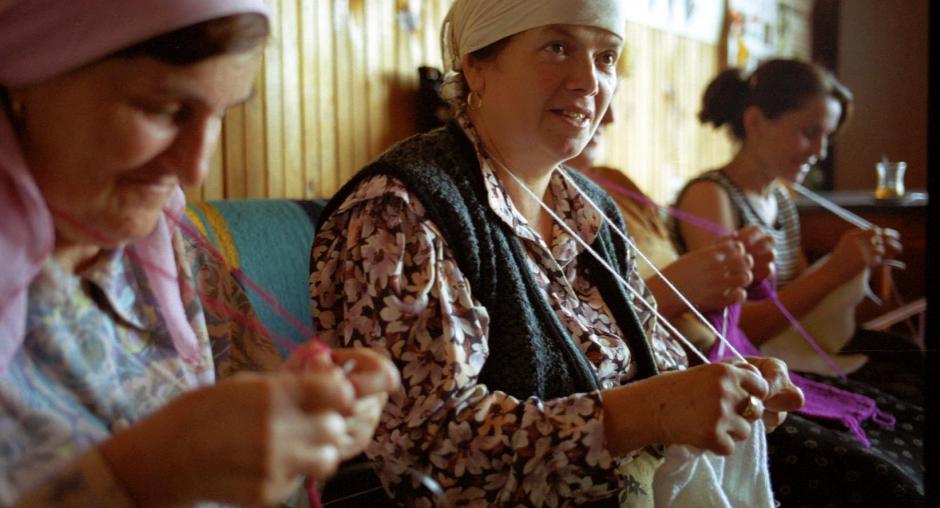Bringing Kosovo communities together
It has a little bit of everything: offices for NGOs, an Internet Cafe and even a radio station. But most importantly, the OSCE Community Centre is a neutral, safe place, where people from across the ethnic divide can come together to learn, work and play.
A perfect place
At the OSCE Community Centre in Fushe Kosove/Kosovo Polje, it is the last day of a training course on reproductive health, organized by the international NGO, Doctors of the World.
"This Community Centre was the perfect place for our training. This venue is so central, it means we could invite Roma, Ashkali, Egyptians, Albanians and Serbs to our sessions. We've already booked this place for future sessions," says Tracey John, Director of Promotions for Doctors of the World.
"Client" base of 35,000 people
The centre was established by the OSCE in October 2000 to serve the 35,000 large, ethnically-mixed community of Fushe Kosove/Kosovo Polje and its surroundings.
It houses 13 NGOs, an Internet centre, meeting rooms and a struggling but vital multi-ethnic radio station, Radio K.
The centre also offers access to photocopiers, phones and faxes - crucial for an area where access to telecommunications is limited.
"The Internet centre is used by NGOS to teach computer skills to local people from all ethnic groups," says Vasilja Stanic, the manager of the centre.
"In the afternoon it is open to the public and usually visited by local teenagers - mostly Albanians, but also some Serbs and Ashkalis. There's a good mix of people and it's very informal. We were even thinking of organizing mixed football matches for local kids."
Brining people together
"After the renovation of the building by the OSCE and other donors, the NGOs here started to co-ordinate their projects. That's one of the benefits of being here together", says Agim Jashari, co-ordinator of the Kosovo Albanian NGO Handikos, which helps people with disabilities.
"For example, we have a great joint project with the women's NGO 'Jehona' - training people to use computers and teaching hairdressing and needlework at the same time."
The Community Centre provides a rare meeting place for all the ethnic groups in Fushe Kosove/Kosovo Polje area, increasing people's sense of security and encouraging minorities to stay.
Trying to stop minorities from leaving
"Tolerance begins right here," says Naim Breznica, the Kosovo Albanian director of multi-ethnic station Radio K, which occupies three rooms on the Centre's second floor.
The station employs Albanians, Serbs, Turks, Macedonians and Ashkalis and has recently hired two Roma journalists.
"This place is vital because it's neutral, so people from different communities can meet here and talk. This station and the centre itself are a home to all communities, a common nest," he adds.
"But even though Fushe Kosovo/Kosovo Polje is the most multi-ethnic place in Kosovo, Serb families are leaving The aim of the radio station, like the centre, is to stop people from leaving. We want all communities to stay."
A second home
The centre is also home to Hand-to-Hand, an NGO which helps Serb and Gorani women to find jobs, education and health care.
"The women enjoy coming to the Centre as they often feel trapped at home," says Nevenka Rikalo, co-ordinator. "At our meetings, they feel safe, they can chat, meet women from other areas, use our library, receive training"
"Before we moved in here, we used to gather in a garage - groups of Ashkali children, teenagers, older people playing chess, and watching television. Freedom of movement was a problem for us before, now it's fine," says Nefail Mustafa, who runs the Ashkali NGO 'Future for All', and has an office close to Nevenka.
Hamit, a 25-year-old student , who regularly comes to use the Internet at the centre, sums it all up: "The Community Centre is like a second home to us. We found each other here."
The OSCE together with the municipality of Fushe Kosove/Kosovo Polje and the United Nations Civil Administration are currently looking into integrating the Community Centre into a wide complex of multi-ethnic facilities which will provide an even greater range of services to people from all communities.

